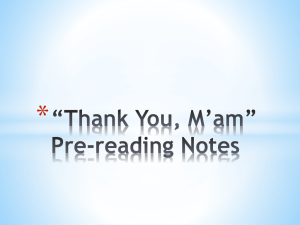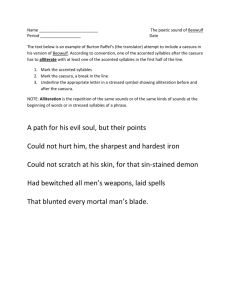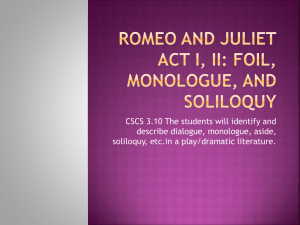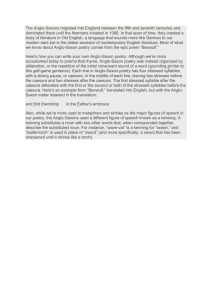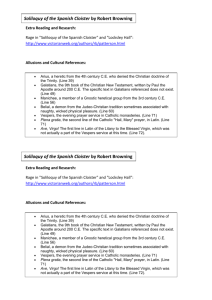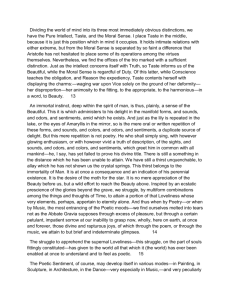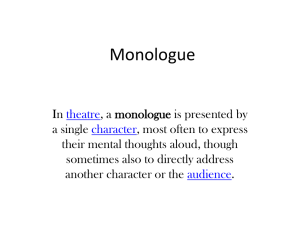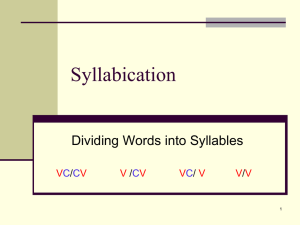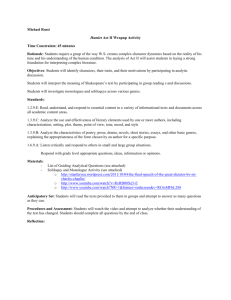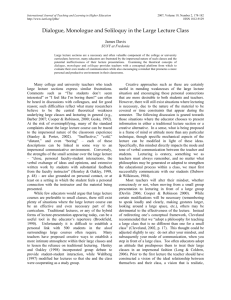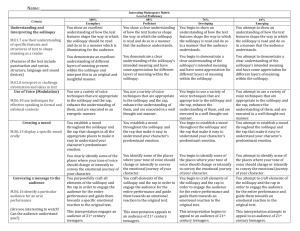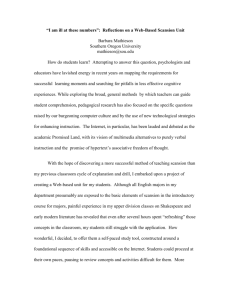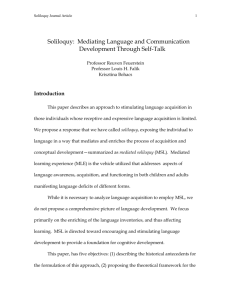List of Term Definitions/Examples
advertisement
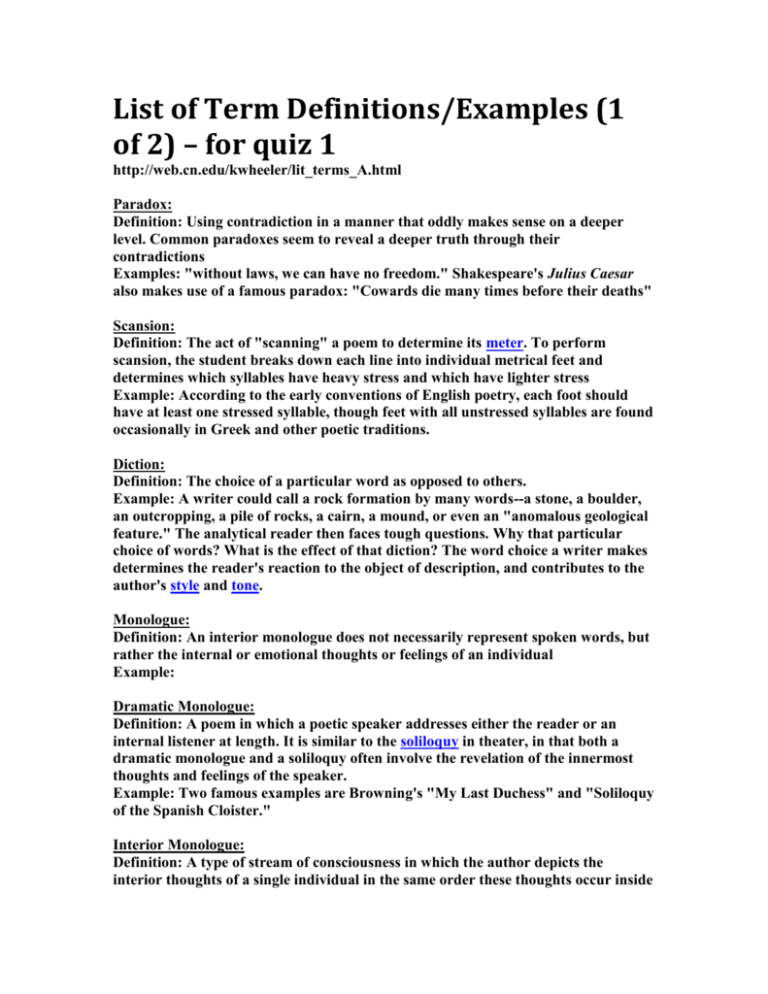
List of Term Definitions/Examples (1 of 2) – for quiz 1 http://web.cn.edu/kwheeler/lit_terms_A.html Paradox: Definition: Using contradiction in a manner that oddly makes sense on a deeper level. Common paradoxes seem to reveal a deeper truth through their contradictions Examples: "without laws, we can have no freedom." Shakespeare's Julius Caesar also makes use of a famous paradox: "Cowards die many times before their deaths" Scansion: Definition: The act of "scanning" a poem to determine its meter. To perform scansion, the student breaks down each line into individual metrical feet and determines which syllables have heavy stress and which have lighter stress Example: According to the early conventions of English poetry, each foot should have at least one stressed syllable, though feet with all unstressed syllables are found occasionally in Greek and other poetic traditions. Diction: Definition: The choice of a particular word as opposed to others. Example: A writer could call a rock formation by many words--a stone, a boulder, an outcropping, a pile of rocks, a cairn, a mound, or even an "anomalous geological feature." The analytical reader then faces tough questions. Why that particular choice of words? What is the effect of that diction? The word choice a writer makes determines the reader's reaction to the object of description, and contributes to the author's style and tone. Monologue: Definition: An interior monologue does not necessarily represent spoken words, but rather the internal or emotional thoughts or feelings of an individual Example: Dramatic Monologue: Definition: A poem in which a poetic speaker addresses either the reader or an internal listener at length. It is similar to the soliloquy in theater, in that both a dramatic monologue and a soliloquy often involve the revelation of the innermost thoughts and feelings of the speaker. Example: Two famous examples are Browning's "My Last Duchess" and "Soliloquy of the Spanish Cloister." Interior Monologue: Definition: A type of stream of consciousness in which the author depicts the interior thoughts of a single individual in the same order these thoughts occur inside that character’s head. The author does not provide any commentary, description, or guiding discussion to help the reader untangle this complex web. Example: Read aloud Persona: Definition: An external representation of oneself which might or might not accurately reflect one's inner self, or an external representation of oneself that might be largely accurate, but involves exaggerating certain characteristics and minimizing others. Example: One of the most famous personae is that of the speaker in Jonathan Swift's "A Modest Proposal." Here, the Irish author Swift, outraged over Britain's economic exploitation of Ireland, creates a speaker who is a well-to-do English intellectual, getting on in years, who advocates raising and eating Irish children as a means of economic advancement Mood: Definition: In literature, a feeling, emotional state, or disposition of mind--especially the predominating atmosphere or tone of a literary work. Most pieces of literature have a prevailing mood, but shifts in this prevailing mood may function as a counterpoint, provide comic relief, or echo the changing events in the plot. The term mood is often used synonymously with atmosphere and ambiance. Example: discussed in class Consonance: A special type of alliteration in which the repeated pattern of consonants is marked by changes in the intervening vowels--i.e., the final consonants of the stressed syllables match each other but the vowels differ. Example: As M. H. Abrams illustrates in The Norton Anthology of English Literature, examples include linger, longer, and languor or rider, reader, raider, and ruder. Assonance: Repeating identical or similar vowels (especially in stressed syllables) in nearby words. Assonance in final vowels of lines can often lead to half-rhyme. Example: Bind up, bind up your yellow hair, And tie it on your neck; And see you look as maiden-like As the day that first we met. (qtd in Deutsche 140). From “Fair Annie” Sibilance: Definition: (sibilant) a consonant characterized by a hissing sound (like s or sh) Examples: see above Narrative Poetry: Definition: a form of poetry which tells a story, often making use of the voices of a narrator and characters as well; the entire story is usually written in metered verse. The poems that make up this genre may be short or long, and the story it relates to may be complex. It is usually dramatic, with objectives, diverse characters, and metre.[ Example: The Canterbury tales Caesura: Definition: A pause separating phrases within lines of poetry--an important part of poetic rhythm Example: Some editors will indicate a caesura by inserting a slash (/) in the middle of a poetic line. Others insert extra space in this location. Others do not indicate the caesura typographically at all. Enjambent: Definition: (French, "straddling," in English also called "run-on line," pronounced on-zhahm-mah): A line having no pause or end punctuation but having uninterrupted grammatical meaning continuing into the next line. Example: Here is an example from George S. Viereck's "The Haunted House": I lay beside you; on your lips the while Hovered most strange the mirage of a smile Such as a minstrel lover might have seen Upon the visage of some antique queen. . . . End-Stop: Definition: In poetry, a line ending in a full pause, often indicated by appropriate punctuation such as a period or semicolon. This contrasts with enjambement or run-on lines, in which the grammatical sense of the sentence continues uninterrupted into the next line. Example: Here is an example of end-stopped rhyme from Robert Browning's "Soliloquy of the Spanish Cloister": G-r-r-r--there go, my heart's abhorrence! Water your damned flowerpots, do. If hate killed men, Brother Lawrence, God's blood, would not mine kill you! What? your myrtle bush wants trimming? Oh, that rose has prior claims-Needs it leaden vase filled brimming? Hell dry you up with its flames! Antithesis: Definition: Using opposite phrases in close conjunction. Examples might be, "I burn and I freeze," or "Her character is white as sunlight, black as midnight." The best antitheses express their contrary ideas in a balanced sentence. It can be a contrast of opposites: Example: "Evil men fear authority; good men cherish it." Alternatively, it can be a contrast of degree: "One small step for a man, one giant leap for all mankind."
